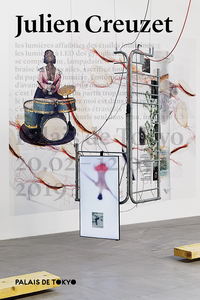

Marguerite Humeau (English edition)
Marguerite Humeau
Bernard Buigues
Carl Safina
Rebecca Lamarche-Vadel
Myths, fantasies and speculations lie at the heart of Marguerite Humeau’s work. Always treading the line between research and fiction, her projects result from in-depth investigations and collaborations with specialists and scientists. At the Palais de Tokyo and Nottingham Contemporary, Humeau is offering a series of unique physical and sensory experiences. Her exhibition FOXP2 is named for the gene whose mutation enabled the arrival of articulate language at the source of our humanity. Here the artist is re-enacting the origins of life and the development of conscious life forms. Imagining a world where giant elephants dominate the planet, Humeau has artificially designed creatures endowed with emotions and consciousness.
Book Contents
- A conversation between Marguerite Humeau and Bernard Buigues. - A conversation between Marguerite Humeau and Carl Safina. - “Who Knows?”: an essay by Rebecca Lamarche-Vadel, curator of Marguerite Humeau’s solo exhibition.
About the authors
- Rebecca Lamarche-Vadel is a curator at the Palais de Tokyo. - Bernard Buigues is a French explorer. He has organized numerous expeditions to the North Pole and Siberia. He is the founder of Mammuthus, a scientific program aimed at -constructing a record of paleobiodiversity through the collection and preservation of fossils throughout the Siberian Arctic. He defines himself as “a mammoth hunter without weapon.” - Carl Safina is the Endowed Professor for Nature and Humanity at Stony Brook University (NY), where he co-chairs the Alan Alda Center for Communicating Science and runs the not-for-profit Safina Center. His books include Beyond Words; What Animals Think and Feel (2015). This book is co-published with Nottingham Contemporary.
Published on the occasion of Marguerite Humeau’s solo exhibitions at the Palais de Tokyo (23.06 – 11.09 2016) and at Nottingham Contemporary (15.10 2016 – 08.01 2017).Détails du livre
-
Éditeur
-
Texte original
Oui -
Langue
Anglais -
Langue d'origine
Français -
Date de publication
-
Nombre de pages
100





